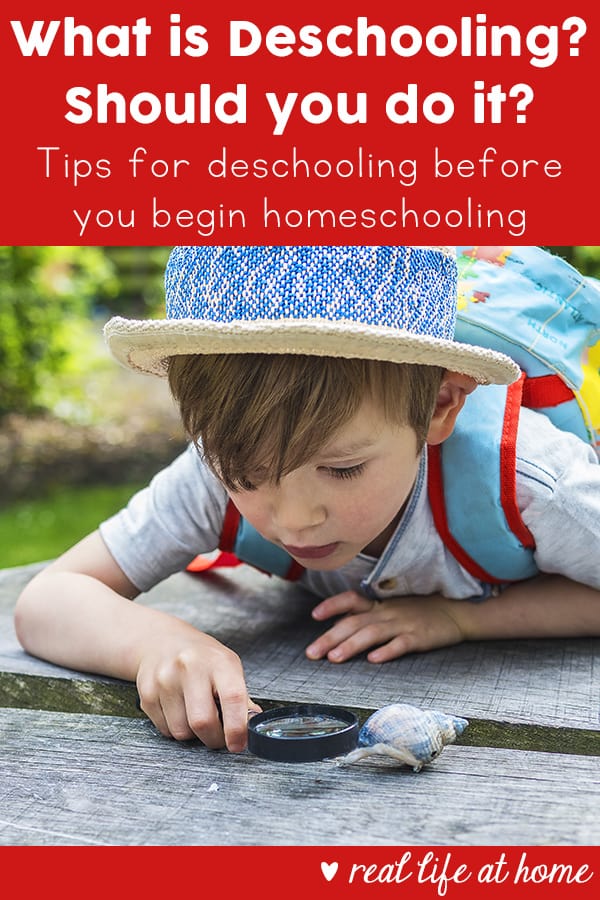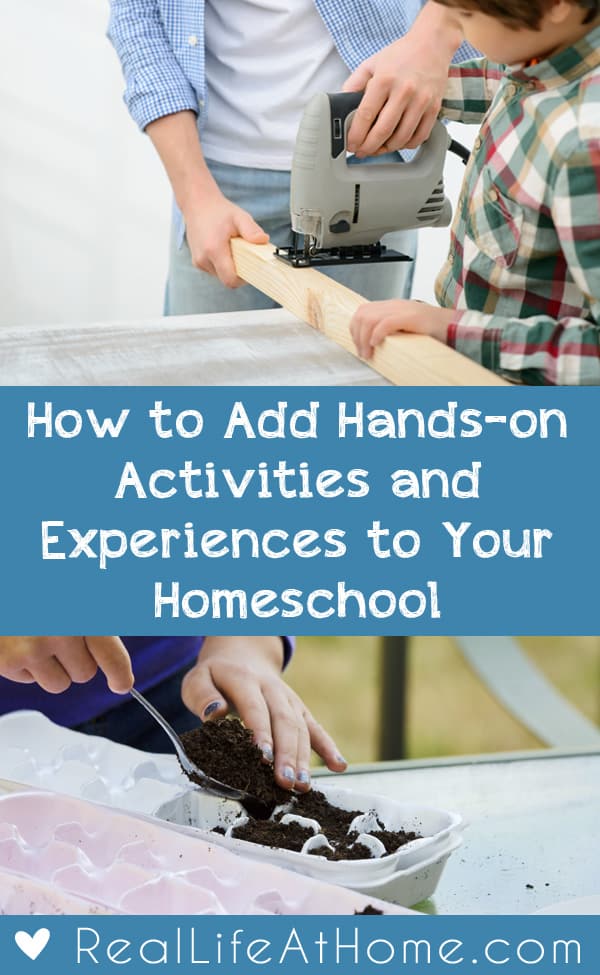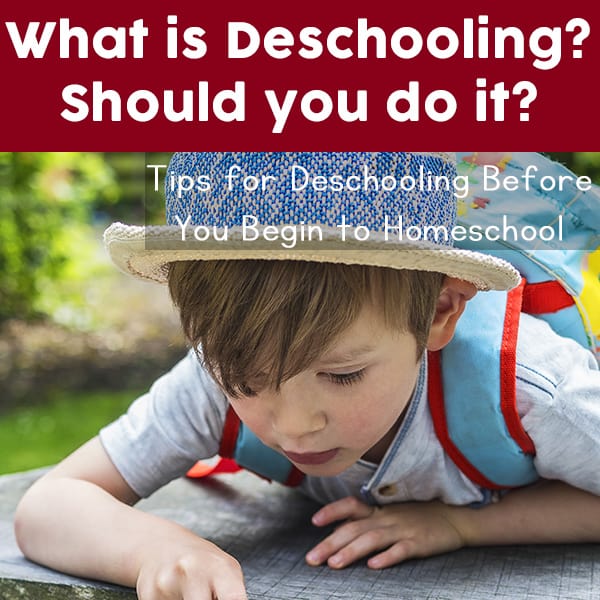advertisement
What Is Deschooling and Is It Important? is a post from contributing writer Kris Bales of Weird, Unsocialized Homeschoolers.
If you’ve been homeschooling a while, you’ve probably heard the term “deschooling.” If you’re new to homeschooling, however, you may have no idea what it means, let alone if it’s something you should do or not.
What Is Deschooling?
advertisement
Deschooling simply means giving your just-removed-from-traditional-schooling child time to decompress before starting formal learning in your homeschool. The idea is that all children are born with a sense of creativity and a desire to learn and that these innate desires have possibly been squelched by an institutionalized school setting.
In giving children time to deschool, you are allowing them time to rediscover their own natural sense of creativity and desire to acquire knowledge.
Read More: How to Transition from Public School to Homeschool: 10 Do’s and Don’ts
How Long Should Our Family Spend Deschooling?
The commonly held belief is that the longer a child has been in a formal school setting, the longer he needs to deschool before you begin formal learning at home. Many advocates recommend one month of deschooling for every year that a child has been in a formal school setting.
For a younger child, this can easily be accomplished in the summer months between the ending of public school and the beginning of homeschool in the fall. For an older child, the time proposed by deschooling advocates can make parents squirm.
Even if you don’t take a full month-per-year off from formal learning, I do think that some time off from formal learning can be good for kids transitioning from public or private school to homeschool.
What Does Deschooling Look Like?
So, what happens during this time of deschooling. Do you allow your child to sit around and play video games or watch TV all day?
No, you shouldn’t allow any more screen time than you normally would. The idea is for the child to begin to rediscover his natural curiosity.
Some ideas for filling this deschooling time could include:
Visits to the library
If it were me, at first I would put no stipulations on the types of books your child checks out (within your family’s value system, of course). Instead, let your child rediscover his love of reading. Later, you might encourage him to branch out in his selections.
I have a friend who used to require each of her children to select one biography and one non-fiction book during each library trip. It didn’t take long before they were selecting more and more of these books by choice. My son actually prefers non-fiction to fiction books.
Artistic Exploration
Encourage your child to experiment with different artistic mediums, such as:
Read More: Art in a Box: Conquering Art Phobia
Fine Arts
Let your child use this time to explore his musical giftings or her flair for the theater. Do you have a community theater where your child could audition for a play or volunteer to help behind-the-scenes?
Does your child have a musical instrument that he would enjoy having more time to play or one that he would enjoy learning? Again, this is a good time to let your child explore without expectation or formal lessons unless he or she has been begging to take lessons.
Read More: Making Time for Music
Field Trips
Use this time to visit all those places that you’ve thought about, but just haven’t had the time to go visit. Your field trips don’t have to be elaborate and formal. Brainstorm some homeschool field trip ideas, then, have fun visiting interesting places.
Our first-ever homeschool field trip was to the downtown historic area of our own city. We visited places we’d heard about or driven past but had never actually seen. That trip still makes our top ten list of most memorable field trips.
Read More: How to Start a Field Trip Co-op
Creative Writing
Use the deschooling time to encourage your child to express herself through the written word with activities such as:
- Journaling
- Blogging
- Short stories
- Novel writing
- Poetry
- A family newspaper
- Comic strips or anime
Read More: Hands-on Poetry Projects for Kids
Tinkering
Got a hands-on learner? Give your child a chance to learn by tinkering!
Let them take apart that old, non-working VCR or fiddle with that TV that’s been on the fritz (taking into account appropriate safety measures). Give them supplies and let them build a clubhouse. Show your children how to change the oil in a car or fix a leaky faucet. Build Lego creations.
Read More: How to Add Hands-on Activities and Experiences to Your Homeschooling
Nature Study
Nature study is a great way to learn about the world around us in a relaxed, low-key way. (You can even do it in your own backyard!) You can also incorporate other creative ways of learning, exploring, and documenting, such as photography, poetry, nature journaling, and flower pressing.
Nature study might also inspire your child to learn more about the things they observe by checking out library books, researching on the Internet, or watching a documentary.
Read More: How to Cultivate Bird Watching as a Fun Family Hobby
Deschooling can be a valuable tool in helping your child transition from a traditional school setting to homeschool. It can also provide much-needed time to rekindle your child’s natural inquisitiveness and creativity.
If you’re removed a child from a more formal school setting, did you take some time for deschooling? If so, did you feel that your child benefited from that time?
Other Posts You Might Enjoy:
Disclosure: This post contains affiliate links. They don’t change the price you pay. However, when you shop through them, we may receive a small compensation.
What Is Deschooling and Is It Important? (Tips for Deschooling Your Child) was originally published on July 30, 2012. It was updated in February 2019.
Homeschool Planning Pages Printables Set {13 Pages}
Subscribe to our newsletter and receive the Homeschool Planning Pages Set for Free.











In the deschooling phase right now. Been taking it really easy over the summer and just now easing into some discovery focus activities. Thanks for some new ideas!
Deschooling myself right now…from public school teaching to homeschooling. It’s nice to play to learn 🙂
This is such a wonderful topic. I have friends at work whose children don’t even get the summers off from school anymore because their teachers tell the parents that they are “behind” and need to read more – but not good literature. Even in the early grades now they are focusing on “informational” reading. These parents tell me they could never homeschool because their kids won’t do the summer work that they try to make them do. I get so frustrated. Perhaps I can give them the link to this post.